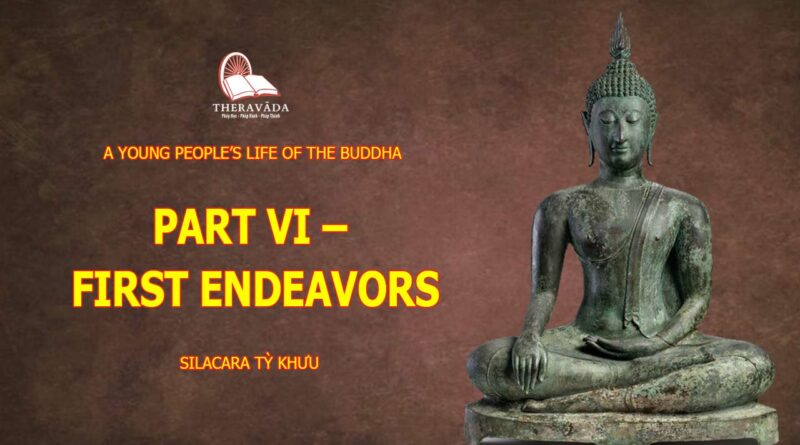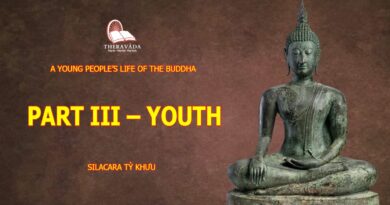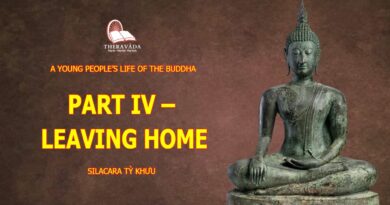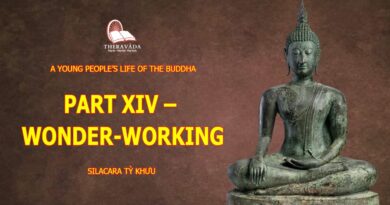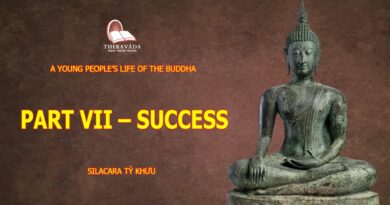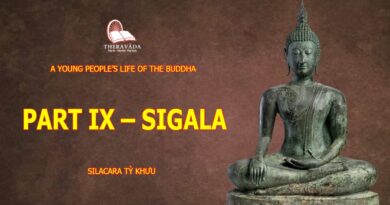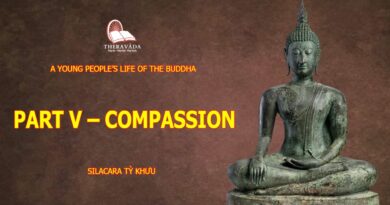A YOUNG PEOPLE’S LIFE OF THE BUDDHA: PART VI – FIRST ENDEAVORS
In those days in ancient India there were very, many different teachers of religion, the same as there are now, who took pupils and taught these pupils all they themselves knew. One of these religious teachers, well known for his knowledge and attainments, was called Alara Kalama, and to this teacher Siddhattha now went in order to learn what he had to teach. And Siddhattha stayed with Alara Kalama a long time and studied under him and practiced the practices his master taught him so diligently that at length he had learned and practiced everything his master knew and practiced. And his master Alara Kalama thought so highly of him and of his great ability that one day he said to him: “Now you know everything I know. Whether you teach my doctrine or whether I teach it, it is all the same. You are the same as I: I am the same as you. There is no difference between us. Stay with me and take my place as teacher to my disciples along with me.”
“But have you nothing more you can teach me?” said Siddhattha. “Can you not teach me the way to get beyond the reach of life and death?”
“No,” said Alara Kalama. “That is a thing I do not know myself, so how can I teach it to you? I do not believe that anybody in the whole world knows that.”
Alara Kalama only knew what he had already taught Siddhattha — the way to a state of consciousness called “the realm of neither perception nor nonperception,” which was a very high state of consciousness, but one which does not save the man who reaches it from the necessity of being born, and therefore of growing old, and falling ill, and eventually dying, over and over again. So, very much disappointed, Siddhattha left his master Alara Kalama, and went away again to wander this way and that throughout the country, looking for some one who knew and could teach him more than he had learned from Alara Kalama.
And after a time he came to hear of another famous teacher of the name of Uddaka, who was said by everybody to possess great knowledge and powers. So Siddhattha now went to this Uddaka and became his pupil and diligently studied and practiced under him until as with Alara Kalama, he was as clever and learned as his master, and knew and practiced all that his master knew and practiced. And Uddaka also, just like Alara Kalama, was so pleased with Siddhattha’s quickness and ability, that he also wanted him to stay with him, and along with him become the leader and teacher of his band of disciples. And Siddhattha asked him the same question that he had asked of Alara Kalama. He asked him if he had no more to teach him, if he could not teach him how to overcome birth and death and all the disagreeable things connected with the same. But Uddaka was in the same position as Alara Kalama in this matter. He did not know how men could get out of the round of birth and death altogether, and had never heard of any one who did know such a thing. So disappointed once more, Siddhattha took leave of Uddaka too, and made up his mind that he would not go to any more teachers to ask about what he wanted to know but henceforth would try to find it out for himself, by his own labor and efforts.
Now it was quite a common thing then in India, as indeed it still is to-day, for those men who leave their homes and follow a religious life to imagine that by going without food and making their bodies uncomfortable and miserable in a number of other ways, that they would earn the right to a long period of peace and happiness hereafter in the world of the gods. They thought that if only a man made himself unhappy enough here, he would make sure of being happy hereafter; and that the more unhappy he made himself now, the more happy he would be in the future. And they carried out this belief of theirs in actual practice just as many of them still do in India to-day.
Some of them reduced the quantity of food they ate, little by little, day after day, until at last they were eating hardly anything at all, so that their poor bodies became mere skin and bones. Some practiced standing on one leg all the time until it turned stiff and lifeless with the continual strain. Others held one arm up in the air all the time until it withered and dried up through the blood not flowing into it properly in that unnatural position. Others, again, held their fists tightly clenched, never letting them loose, until the nails at the ends of their fingers actually grew into the palms of their hands, and through the flesh, and out at the backs of their hands! Others never lay down at night except on a bed of thorns, or else on a board with sharp nails all over it, their points sticking upwards.
And Siddhattha, because he was anxious and determined to find out what he wanted to know, and did not care how much trouble and pain he had to go through if only at last he might succeed, did very much the same as these other ascetics who were seeking religious truth. He did not know any better way than to do just as the others did. He honestly hoped and believed that if only he tortured and tormented his body enough, at last as reward he would obtain enlightenment of mind.
Here is part of the story of what he did in those days, as he told it himself in after years to one of his foremost disciples, the Thera Sariputta.
“I practiced the holding in of my breath,” said the Buddha to Sariputta, “until it made a great roaring in my ears, and gave me a pain in my head as if some one was boring into it with a sharp sword, or lashing me over the head with a leather whip. In my body also, I suffered pains as if a butcher were ripping me up with a knife, or some one had flung me into a pit of red-hot coals.
“And then I practiced loneliness. On the nights of the new moon and of the full moon, I went out to lonely places among the trees where the dead lay buried, and stayed there all the night through hearing the leaves rustling and the twigs dropping when a breeze blew, with my hair all standing on end with fright. When a bird came and lighted on a bough, or a deer or other animal came running past, I shook with terror, for I did not know what it was that was coming up to me in the dark. But I did not run away. I made myself stay there and face the fear and terror I felt until I had mastered it.
“I also went without food. I practiced eating only once a day, then only once in two days, then only once in three days, and so on until I was only eating once in fourteen days. I have lived eating nothing but grass, nothing but moss, wild fruits and roots, wild herbs and mushrooms, wild rice, and the dust I scraped up of thrashing floors. I covered my body only with garments made out of rags from graveyards and dust-heaps, with old skins of animals that had died in the fields, with woven grass, with patches made of birds’ wings and tails that I found lying here and there.
“In the lonely forests I lived alone never seeing a human being for weeks and months. In winter, when it was cold at night, I stayed out in the open without a fire to keep me warm. And in the day-time, when the sun came out, I hid myself among the cold trees. And in the burning heat of summer, I stayed out by day in the open under the hot sun; and at night I went into the close, stifling thickets.
“I also practiced what was called ‘purification by food’. I lived on nothing but beans, then on nothing but sesamum seed, then on nothing but rice. And I reduced the quantity I ate of these day by day, until at last I was eating only one bean a day, one sesamum seed a day, one grain of rice a day.
“And through eating so little food, my body became terribly thin and lean. My legs became like reeds, my hips like camel’s hoofs. My backbone stood out on my back like a rope, and on my sides my ribs showed like the rafters of a ruined house. My eyes sank so far in my head that they looked like water at the bottom of a deep well and almost disappeared altogether. The skin of my head grew all withered and shrunken like a pumpkin that has been cut and laid out in the sun. And when I tried to rub my arms and legs to make them feel a little better, the hair on them was so rotted at the roots that it all came away in my hands.
“And yet, Sariputta, in spite of all these pains and sufferings, I did not reach the knowledge I wanted to reach, because that knowledge and insight was not to be found that way, but could only be got by profound reasoning and reflection, and by turning away from everything in the world.”
In this way, for six or seven long years, Siddhattha put his body to all kinds of torment, thinking that by doing this, if only he went on long enough, at last he would get to know what he wanted, all the while wandering about here and there through the country of Northern India.
At length, in the course of these wanderings, he came to the land of Magadha again, to a nice quiet place in a bamboo grove beside a broad, smooth-flowing river, with a good bathing-place, and a village close by where he could easily go and beg food. He liked the look of this place as soon as he saw it. “This is a good place to stay in,” he said to himself, “for any ascetic like myself who wants to strive and struggle for knowledge. Here I will stay.”
So in this place, called Uruvela, Siddhattha now took up his fixed residence, under the trees meditating and striving hard, fasting and otherwise treating his poor body very badly, all in the hope that by such pains and endeavors he would gain a knowledge of the truth he sought.
Meanwhile there had gathered round him a little band of disciples who admired him very much as they saw how he starved himself and otherwise made himself undergo severe hardships. And these disciples, five in number, waited upon him and attended to his few wants, for they thought that an ascetic who could make himself suffer such pains and privations, and persevere in them as did Siddhattha, must be no common man. They thought, indeed, they felt sure, that an ascetic with so much endurance and determination, must be certain to get what he was looking for, and that when he had found it, then he would tell it to them, his pupils and followers.
But one day it happened that as he sat alone under a tree, the poor prince-ascetic, all worn out with fasting and hardships, and added to that, the strain of intense and prolonged meditation, fell down in a dead faint, and lay there on the ground so completely exhausted and without strength that perhaps he would never have risen again but died there just where he lay. Fortunately, however, a boy who was watching some goats near by happened to come along by the tree under which Siddhattha lay in a swoon; and when he saw the holy man lying there, the boy at once guessed that he was dying for want of proper food, for everybody round about knew that he was a very holy man, and went without food for days and days. So the boy ran back to his goats and brought up one of them, and milked some milk from its teats into the half-open mouth of the holy man, without touching him with his hands, for he did not dare, he a common herd-boy, to lay his hands on a saint.
Very soon the good, fresh milk began to produce its effect upon the half-dead Siddhattha. After a little while he was able to sit up, feeling very much better than he had felt for a long time. And he began to think about why it was he had fainted, and why he was now feeling so much refreshed in body and mind. And these are the thoughts that passed through his mind:
“O how foolish I have been! I left my wife and family and home and everything, and became a homeless wanderer because I wanted to get to know the truth about man’s life and how he must live it to the best purpose. But in order to gain a knowledge so difficult to gain as this, I needed to have a brain and a mind as strong and vigorous as I possibly could get, so that I might be able to think and meditate steadily and strongly. And then I went and made my body weak and wretched with starvation and those other practices I practiced! But how can a man have a strong and healthy mind if his body is weak and miserable and unhealthy? O how foolish I have been to make myself weak just when I need all the strength I can get to carry through the great task I have set myself to perform! After this I shall eat all the food my body requires to keep it in god condition. I shall not eat too much, for that will make me dull and heavy and sleepy, and then I shall not be able to think and meditate properly. But I shall eat enough to keep me well and strong, so that I may have a clear, unclouded mind, and so perhaps, at last, I shall be able to gain the truth I want to reach.”
So, with thoughts like this in his mind, Siddhattha turned to the goat-herd boy who now was kneeling before him in veneration, and asked him if he would kindly give him a little more of his goat’s milk in a dish, as it was doing him very much good.
“O Reverend Lord,” said the boy, “I cannot do that. I cannot give you milk in a dish that has been touched by my hand. I am only a common herd-boy of low caste, and you are a holy man, a Brahmin. If I were to touch you with anything I had touched, it would be a crime.”
But Siddhattha replied: “My dear boy, I am not asking you for caste: I am asking you for milk. There is no real difference between us two, even although you are a goat-herd and I am a hermit. It is blood that flows in the veins of both of us. If some robbers were to come and cut us both with swords, the blood that would flow from both our bodies would be of the same red colour. And if it went on running and nobody stopped it, we should both of us die with no difference between us. If a man does high and noble deeds, then he is a high and noble man. And if a man does low and ignoble deeds, then he is a low and ignoble man. That is all the real caste there is. You have done a good kind deed in giving me milk when I was almost dead for want of food; therefore you are of good caste to me. Give me some more milk in a dish.”
The herd-boy did not know what to say to these strange but so very pleasant words from this extraordinary hermit who did not send him away from him because he was a low-caste herd-boy, but instead wanted more milk from him, and would take it out of a dish. But he went off, and soon came back with a bowl full of his best goat’s milk which he joyfully offered to the kind hermit who had told him that he was of as good a caste to him. Then he took back his empty bowl, and after bowing down before the hermit and asking his blessing, went back glad and happy to his goats.
But the prince-ascetic, now thoroughly refreshed with the good drink of milk, sat on beneath the tree, meditating more successfully than he had done for a long time. And as he still sat there in the dark after the sun had gone down, he heard the sound of girls’ voices singing. It was a band of professional singers and dancers going to a neighboring town to give an entertainment; and as they passed along close to where he sat, he distinctly heard the words of their song which was about the instrument they played when they sang, called a lute. They were saying, in their song, that if the strings of the lute were hung too slack, they made very poor music; and if they were stretched too tight, then they broke and made no music at all. Therefore, so they sang, it was best to stretch the strings neither too slack nor too tight, but just medium, and then they would give proper music.
“That is true what these girls sing,” thought the prince-ascetic as he heard them. “These girls have taught me something. I have been stretching the strings of my poor body far too tight this long time, and they have come very near to breaking altogether. If that boy had not come and brought me the milk to-day, I should have died, and then what would have become of my search for the Truth? There and then it would have come to an end. My search for that which I and all men need to know would have failed miserably just for want of a little food for my body. This harsh way of treating the body cannot be the proper way to find Truth. I will give it up at once and treat my body with proper care and attention henceforth.”
So when, next day, a young woman called Sujata, who lived near by, came to him in his hermitage among the trees with a bowl full of extra good rice boiled with very good rich milk, which she had specially prepared for him, saying as she gave it to him: “May you be successful in obtaining your wishes as I have been!” He did not refuse her gift, but accepted it with pleasure, and felt the benefit of it at once in a greatly strengthened body and mind.
After this, Siddhattha went out again every morning to the village to beg food, and eating what he got there each day, he soon became strong again and his skin became a good colour, almost as clear and golden as it used to be in the old days when he lived in his father’s palace.
But although he himself now saw that the pains and hardships to which he subjected himself were just like trying to tie air into knots, or weave ropes out of soft sand, for all the help it was to him in his search for the Truth, the five disciples who believed in him and had hitherto stayed with him through everything did not think this at all. They still believed, like everybody else in India in those days, that the one only way to find the Truth in religious matters was to make yourself miserable in body.
So when they saw the master and teacher they had hitherto admired, so much for the way in which he starved and in other ways ill-treated and tormented his body, beginning to eat all his body required of the rice and curry he got when he went out begging, they were very much disappointed with him, and they said among themselves: “Ah, this Sakya ascetic has given up striving and struggling. He has gone back to a life of ease and comfort.” And the whole five of them turned away from their old master and left him, for they felt sure that there was no use in staying any longer with a teacher who did not starve himself and in other ways make himself miserable. Such an ascetic, they were sure, could never possibly attain to any great knowledge of religious truth.
How very much mistaken, how very far wrong, these five disciples of the prince-ascetic were, was soon made clear to them. Their master and teacher, far from having turned back from his goal, was now on the very point of reaching it.
Source: Budsas.net

